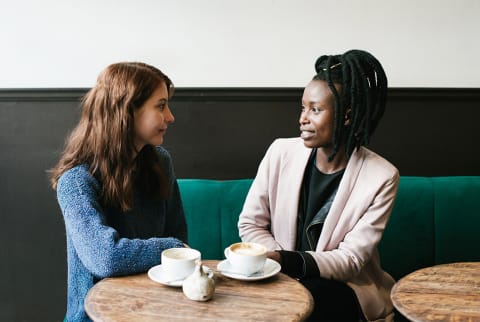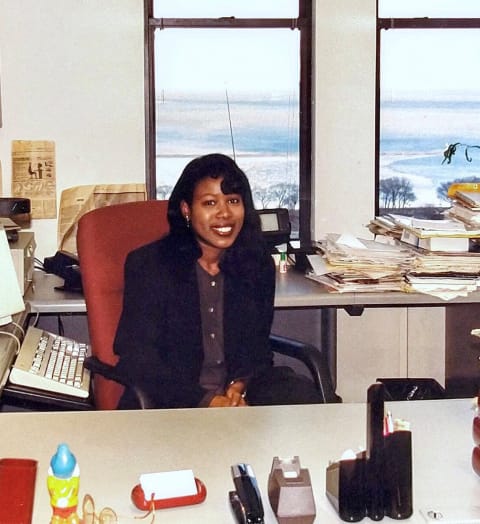How Can We Be More Effective At Inspiring Social Change?

From the wellness perspective, we find ourselves on a constant journey of learning how to heal the cause of our ailments, not just the symptoms. Because usually what's beneath the surface points to deeper understanding and resolution. The book Caste: The Origins of Our Discontents, by Isabel Wilkerson, takes this inquisitive approach to a much broader realm: American society and culture. Taking a much-needed closer look at modern American life, Wilkerson explains that what's under the surface is a "hidden caste system." As she discusses the history and components of caste systems across the world, Wilkerson connects how they affect the larger whole in terms of physical and mental health, politics, culture, and beyond. As with wellness—the better we understand what's happening at the root, the more equipped we are to instill positive change.
For more insight into these social dynamics, check out the excerpt below, before buying your own copy of Caste: The Origins of Our Discontents here.
Advertisement
Caste: The Origins of Our Discontents
Each of us is in a container of some kind. The label signals to the world what is presumed to be inside and what is to be done with it. The label tells you which shelf your container supposedly belongs on. In a caste system, the label is frequently out of sync with the contents, mistakenly put on the wrong shelf, and this hurts people and institutions in ways we may not always know.

Advertisement
Back before Amazon and iPhones, I was a national correspondent at the New York Times, based in Chicago. I had decided to do a lighthearted piece about Chicago's Magnificent Mile, a prime stretch of Michigan Avenue that had always been the city's showcase, but now some big names from New York and elsewhere were about to take up residence. I figured New York retailers would be delighted to talk. As I planned the story, I reached out to them for interviews. Everyone I called was thrilled to describe their foray into Chicago and to sit down with the Times.
The interviews went as expected until the last one. I had arrived a few minutes early to make sure we could start on time, given the deadline I was facing.
The boutique was empty at this quiet hour of the late afternoon. The manager's assistant told me the manager would be arriving soon from another appointment. I told her I didn't mind the wait. I was happy to get another big name in the piece. She went to a back corner as I stood alone in a wide-open showroom. A man in a business suit and overcoat walked in, harried and breathless. From the far corner, she nodded that this was him, so I went up to introduce myself and get started. He was out of breath, had been rushing, coat still on, checking his watch.
"Oh, I can't talk with you now," he said, brushing past me. "I'm very, very busy. I'm running late for an appointment."
I was confused at first. Might he have made another appointment for the exact same time? Why would he schedule two appointments at once? There was no one else in the boutique but the two of us and his assistant in the back.
"I think I'm your appointment," I said.
"No, this is a very important appointment with the New York Times," he said, pulling off his coat. "I can't talk with you now. I'll have to talk with you some other time."
"But I am with the New York Times," I told him, pen and notebook in hand. "I talked with you on the phone. I'm the one who made the appointment with you for four-thirty."
"What’s the name?"
"Isabel Wilkerson with the New York Times."
"How do I know that?" he shot back, growing impatient. "Look, I said I don't have time to talk with you right now. She'll be here any minute."
He looked to the front entrance and again at his watch.
"But I am Isabel. We should be having the interview right now."
He let out a sigh. "What kind of identification do you have? Do you have a business card?"
This was the last interview for the piece, and I had handed them all out by the time I got to him.
"I've been interviewing all day," I told him. "I happen to be out of them now."
"What about ID? You have a license on you?"
"I shouldn't have to show you my license, but here it is."
He gave it a cursory look.
"You don't have anything that has the New York Times on it?"
"Why would I be here if I weren't here to interview you? All of this time has passed. We've been standing here, and no one else has shown up."
"She must be running late. I'm going to have to ask you to leave so I can get ready for my appointment."
I left and walked back to the Times bureau, dazed and incensed, trying to figure out what had just happened. This was the first time I had ever been accused of impersonating myself. His caste notions of who should be doing what in society had so blinded him that he dismissed the idea that the reporter he was anxiously awaiting, excited to talk to, was standing right in front of him. It seemed not to occur to him that a New York Times national correspondent could come in a container such as mine, despite every indication that I was she.
The story ran that Sunday. Because I had not been able to interview him, he didn't get a mention. It would have amounted to a nice bit of publicity for him, but the other interviews made it unnecessary in the end. I sent him a clip of the piece along with the business card that he had asked for. To this day, I won't step inside that retailer. I will not mention the name, not because of censorship or a desire to protect any company's reputation, but because of our cultural tendency to believe that if we just identify the presumed-to-be-rare offending outlier, we will have rooted out the problem. The problem could have happened anyplace, because the problem is, in fact, at the root.
Isabel Wilkerson, winner of the Pulitzer Prize and the National Humanities Medal, is the author of the critically acclaimed New York Times bestseller The Warmth of Other Suns. Her debut work won the National Book Critics Circle Award for Nonfiction and was named to Time’s 10 Best Nonfiction Books of the 2010s and the New York Times's list of the Best Nonfiction of All Time. She has taught at Princeton, Emory, and Boston Universities and has lectured at more than 200 other colleges and universities across the United States and in Europe and Asia.
Advertisement

Devon Barrow is a Branded Content Editor at mindbodygreen. She received her degree from the University of Colorado. When she's away from her desk, Devon is teaching yoga, writing poetry, meditating, and traveling the world. She's based in Boulder, Colorado.
Devon's first book, Earth Women, is coming soon. To learn more, join the mailing list, and receive updates, head to www.devonbarrowwriting.com.
